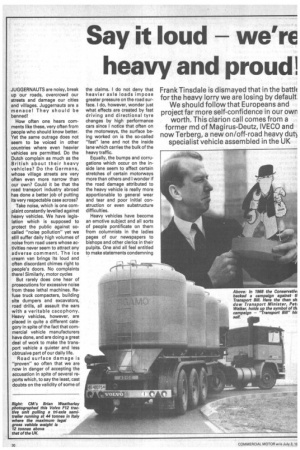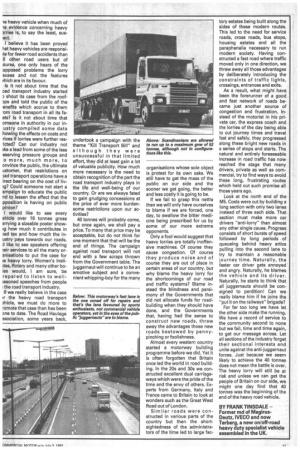Say it loud we're heavy and proud!
Page 24

Page 25

If you've noticed an error in this article please click here to report it so we can fix it.
JUGGERNAUTS are noisy, break up our roads, overcrowd our streets and damage our cities and villages. Juggernauts are a menace! They should be banned!
How often one hears comments like these, very often from people who should know better. Yet the same outrage does not seem to be voiced in other countries where even heavier vehicles are permitted. Do the Dutch complain as much as the British about their heavy vehicles? Do the Germans, whose village streets are very often even more narrow than our own? Could it be that the road transport industry abroad has done a better job of putting its very respectable case across?
Take noise, which is one complaint constantly levelled against heavy vehicles. We have legislation which is supposed to protect the public against socalled "noise pollution" yet we still suffer daily high volumes of noise from road users whose activities never seem to attract any adverse comment. The ice cream van brings its loud and often discordant chimes right to people's doors. No complaints there! Similarly, motor cycles But rarely does one hear of prosecutions for excessive noise from these lethal machines. Refuse truck compacters, building site dumpers and excavators, road drills, all assault the ears with a veritable cacophony. Heavy vehicles, however, are placed in quite a different category in spite of the fact that commercial vehicle manufacturers have done, and are doing a great deal of work to make the transport vehicle a quieter and less obtrusive part of our daily life.
Road surface damage is "proven" so often that we are now in danger of accepting the accusation in spite of several reports which, to say the least, cast doubts on the validity of some of the claims. I do not deny that heavier axle loads impose greater pressure on the road surface. I do, however, wonder just what effects are created by fast driving and directional tyre changes by high performance cars since I notice that often on the motorways, the surface being worked on is the so-called "fast" lane and not the inside lane which carries the bulk of the heavy traffic.
Equally, the bumps and corrugations which occur on the inside lane seem to affect certain stretches of certain motorways more than others and I wonder if the road damage attributed to the heavy vehicle is really more apportionable to general wear and tear and poor initial construction or even substructure difficulties.
Heavy vehicles have become an emotive subject and all sorts of people pontificate on them from columnists in the ladies pages of our newspapers to bishops and other clerics in their pulpits. One and all feel entitled to make statements condemning le heavy vehicle when much of le evidence concerning heavy nries is, to say the least, susect.
I believe it has been proved at heavy vehicles are responsihi for fewer road accidents than II other road users but of ourse, one only hears of the upposed problems the lorry auses and not the features rhich are in its favour.
Is it not about time that the Dad transport industry started 3 shout its case from the roof)S and told the public of the enefits which accrue to them *am road transport in all its fasts? Is it not about time that omeone in authority in our inustry compiled some data howing the effects on costs and rices if lorries were further resicted? Can our industry not Ike a lead from some of the less eserving pressure groups and o more, much more, to onvince the public, the ultimate ustomer, that restrictions on )ad transport operations have a irect bearing on the cost of livig? Could someone not start a ampaign to educate the public nd to lessen the effect that the pposition is having on public pinion?
I would like to see every elide over 16 tonnes gross 3rrying a sizeable poster showig how much it contributes in
:1 )ad tax and how much the inustry p‘ s towards our roads.
J like t see speakers offering ieir services to all the many oranisatioris to put the case for is heavy lorry. Women's Instiites, Rotary and many other boies would, I am sure, be repared to listen to welliasoned speeches from people I the road transport industry.
If we really believe in the case 1r the heavy road transport 3hicle, we must do more to romote that case than has been Dne to date. The Road Haulage ssociation, some years back, undertook a campaign with the theme "Kill Transport Bill" and although they were unsuccessful in that limited effort, they did at least gain a lot of valuable publicity. How much more necessary is the need to obtain recognition of the part the road transport industry plays in the life and well-being of our country. Or are we always fated to gain grudging concessions at the price of ever more burdensome restrictions upon our activities?
40 tonnes will probably come, but once again, we shall pay a price. To many that price may be acceptable, but do not think for one moment that that will be the end of things. The campaign against road transport will not end with a few scraps thrown from the Government table. The juggernaut will continue to be an emotive subject and a convenient whipping-boy for the many organisations whose sole object is protest for its own sake. We still have to get the mass of the public on our side and the sooner we get going, the better and less costly it is going to be.
If we fail to grasp this nettle then we will only have ourselves to blame if we are forced, one day, to swallow the bitter medicine being prescribed for us by some of our more extreme opponents.
Only a fool would suggest that heavy lorries are totally inoffensive machines. Of course they cause congestion. Of course they produce noise and of course they are out of place in certain areas of our country, but why blame the heavy lorry for the shortcomings of our road and traffic systems? Blame instead the blindness and parsimony of the Governments that did not allocate funds for roadbuilding when they should have done, and the Governments that, having had the sense to construct new roads, threw away the advantages those new roads bestowed by pennypinching or foolishness.
Almost every western country started a motorway building programme before we did. Yet it is often forgotten that Britain once led the world in road building. In the 20s and 30s we constructed excellent dual carriageways which were the pride of the time and the envy of others. Experts from Germany, Italy and France came to Britain to look at wonders such as the Great West Road out of London.
Similar roads were constructed in various parts of the country but then the shortsightedness of the administrators of the time led to large fac tory estates being built along the sides of these modern routes. This led to the need for service roads, cross roads, bus stops, housing estates and all the paraphenalia necessary to run modern society. Having constructed a fast road where traffic moved only in one direction, we threw away all those advantages by deliberately introducing the constraints of traffic lights, crossings, entrances and exits.
As a result, what might have been the forerunner of a good and fast network of roads became just another source of congestion and frustration. Instead of the motorist in his private car, the express coach and the lorries of the day being able to cut journey times and travel fast and safely, they progressed along these bright new roads in a series of stops and starts. The natural and entirely foreseeable increase in road traffic has now reached the stage that many drivers, private as well as commercial, try to find ways to avoid these long, frustrating routes which held out such promise all those years ago.
Look at the north end of the M5. Costs were cut by building a long section with only two lanes instead of three each side. That section must make more car drivers "anti-lorry" than almost any other single cause. Progress consists of short bursts of speed followed by long periods of queueing behind heavy artics pulling into the second lane to try to maintain a reasonable journey time. Naturally, the faster car driver gets annoyed and angry. Naturally, he blames the vehicle and its driver. Naturally, he starts to think that all juggernauts should be consigned to perdition! Can we really blame him if he joins the "put it on the railways" brigade?
For far too long we have let the other side make the running. We have a record of service to the community second to none but we fail, time and time again, to get our message across. Let all sections of the industry forget their sectional interests and unite against the anti-juggernaut forces. Just because we seem likely to achieve the 40 tonnes does not mean the battle is over. The heavy lorry will still be at risk and unless we can get the people of Britain on our side, we might one day find that 40 tonnes was the beginning of the end of the heavy road vehicle.








































